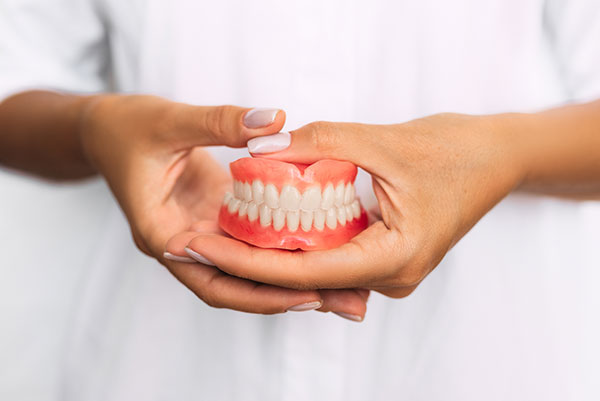Our Everett Dentist Breaks Down Risks and Complications of Dentures
While dentures can be an effective way to restore a person’s ability to eat, speak, and smile, they also come with potential complications. Gum irritation, mouth infections, and difficulty speaking are among the most common risks associated with dentures.
Understanding these risks and how to prevent them can help individuals make informed decisions about their dental care and maintain good oral health. Contact Just Smile Dental today by calling (425) 341-1111 to schedule an appointment.
Denture Risks and Complications
Gum Irritation
Ill-fitting dentures or dentures that aren’t properly cleaned can cause gum irritation, soreness, redness, and inflammation in the gums. This is one of the most common complaints about dentures, making it difficult to wear them comfortably.
Mouth Infections
Dentures can harbor food particles, bacteria, and fungi, leading to mouth infections if not properly cleaned. Poor denture care and neglecting to clean dentures daily can increase the risk of these issues. Poor hygiene can also cause bad breath, which can be embarrassing and socially isolating.
Dry Mouth
Dry mouth is a common problem for denture wearers. This is because dentures can rub against the gum tissue and irritate the salivary glands. A dry mouth can make it difficult to keep the dentures clean and can also lead to other problems, such as tooth decay and gum disease.
Difficulty Speaking and Eating
Dentures can feel bulky and uncomfortable, which can make it difficult to eat and speak properly. It may take time to adjust to speaking with new dentures or full dentures, and some people may never fully adapt to wearing dentures.
Changes in Taste
Upper dentures can cover the taste buds on the roof of the mouth, altering your ability to taste food properly. Some denture wearers may also experience a metallic taste in their mouths due to the materials used to make the dentures.
Bad Breath (Halitosis)
Bad breath, also known as halitosis, can be a problem for denture wearers. This is because bacteria can grow on dentures, especially if they are not cleaned properly.
Bone Loss
When teeth are missing, the jawbone can start to shrink over time. This can cause dentures to become loose and ill-fitting, which can lead to discomfort and difficulty eating. Bone loss can also affect the appearance of the face, causing a sunken or aged look.
Gum Disease
Dentures can trap food particles and bacteria, which can lead to gum disease if not properly cleaned. Denture wearers should clean their prostheses thoroughly after each meal and brush their gums and tongues to prevent gum disease.
Dentures Stomatitis
Denture stomatitis is a common fungal infection that occurs in the mouth of denture wearers. It is caused by a buildup of bacteria and yeast on the dentures. Symptoms include redness, soreness, and white patches on the gums.
Preventing Denture Problems
To reduce the risk of denture complications and maintain good oral health, it’s essential to:
- See your dentist regularly for checkups and adjustments to ensure your dentures fit correctly
- Practice proper denture care by brushing, soaking, and using a denture cleaner
- Quit smoking to lower the risk of gum disease and other oral issues
- Eat a nutritious diet with soft foods while adjusting to new dentures
- Be aware of how your dentures feel and report any discomfort, pain, or irritation promptly
While replacing missing teeth with dentures has many benefits, being informed about the potential risks can help you take steps to prevent denture problems. If you experience gum irritation, mouth infections, difficulty eating, or other issues, contact your dentist right away.
Frequently Asked Questions
Wearing your dentures all the time can increase the risk of some complications, such as:
- Irritation and inflammation of the gums: Dentures that are worn all the time can put pressure on the gums, which can lead to irritation and inflammation. This can cause pain, redness, and swelling.
- Dry mouth: Dentures can rub against the gums and irritate the salivary glands, which can lead to a dry mouth. A dry mouth can make it difficult to keep the dentures clean and can also lead to other problems, such as tooth decay and gum disease.
- Infections: Dentures can harbor bacteria, which can lead to infections in the mouth, such as tooth decay, gum disease, and pneumonia.
There are a few things you can do to prevent denture problems, including:
- Take good care of your dentures: This includes brushing and flossing them daily, using a denture cleaner, and having them adjusted by your dentist as needed.
- See your dentist regularly: This will help to identify any problems early on and prevent them from getting worse.
- Quit smoking: Smoking can increase the risk of gum disease and other problems that can lead to denture complications.
- Maintain a healthy diet: Eating a healthy diet can help to keep your gums and jaw bones healthy, which can help to prevent denture problems.
- Be aware of your dentures: Be aware of how your dentures fit and feel, and report any problems to your dentist right away.
Learn More About Dentures Today!
While dentures can provide many benefits, they do come with some risks. To minimize the risk of complications, it’s important to properly clean and care for your dentures, and to see our Everett dentist regularly for checkups and adjustments.
If you experience any problems with your dentures, such as gum irritation, mouth infections, or difficulty speaking, be sure to contact Dr. Webley at (425) 341-1111 for advice and treatment. We welcome patients in Edmonds, Marysville, Lynnwood, and Silver Firs, WA.



